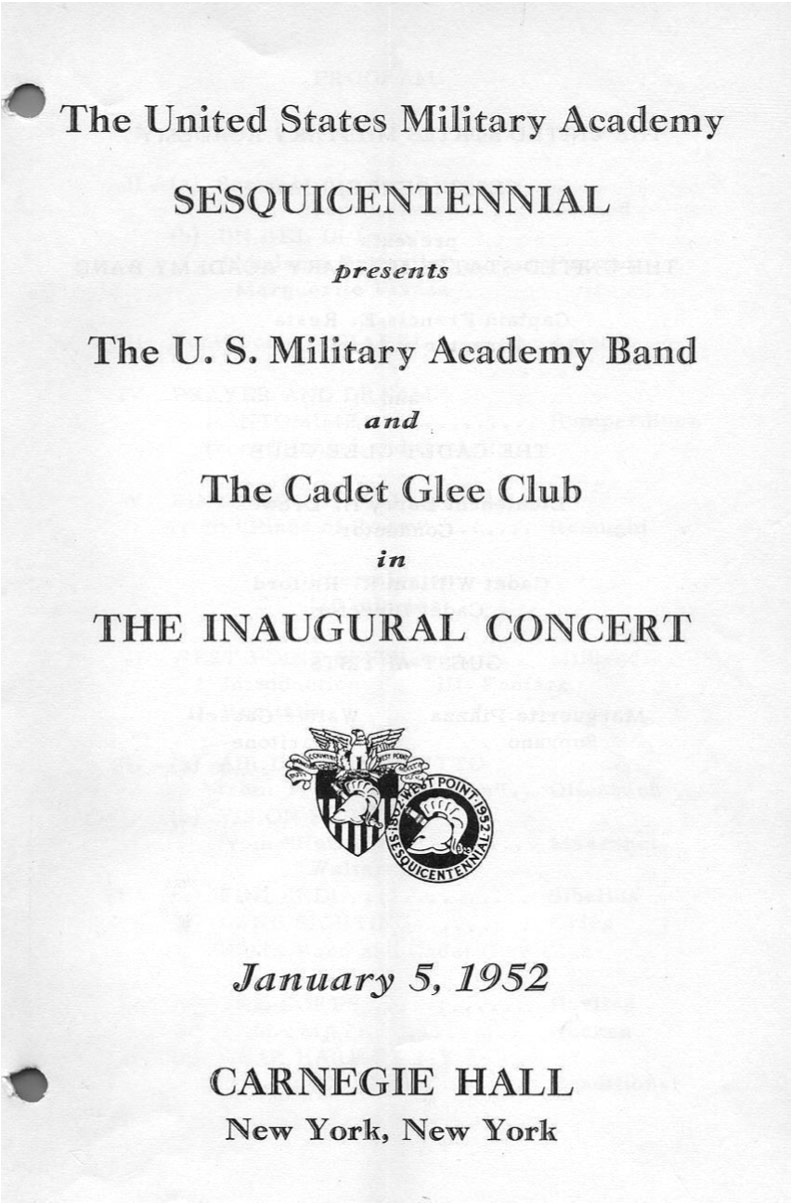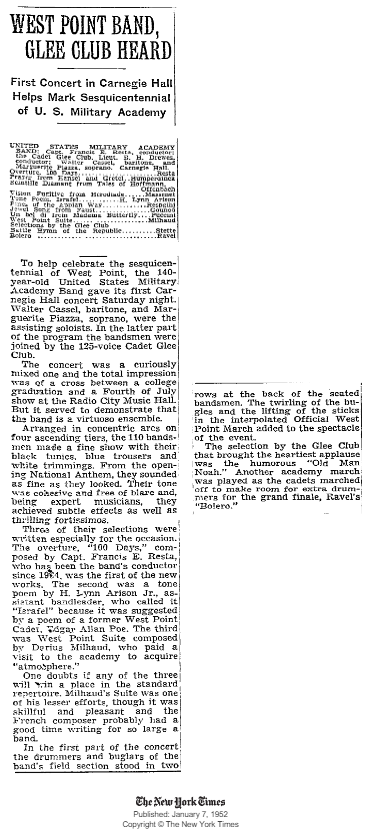In 1952, the West Point Band commissioned 13 new works for military band in celebration of West Point’s 150th anniversary. One of the earliest attempts to establish a new repertoire for bands, it opened the door for wind ensemble music to be taken seriously as an art form, and it helped set a new precedent for college and professional bands all over the country.
In the early 20th century, most programs for band consisted mainly of orchestral transcriptions, yet the dominant perception was that transcriptions would never sound as the composer intended, and a band performance would never capture the intent of an orchestral work in its original form. It was difficult to get composers to write music for wind ensembles as there was little precedence, and it was not taken seriously as a genre.
Enter Captain Francis Resta, the West Point Band’s Commander and West Point Teacher of Music from 1934 to 1957. Resta took it upon himself to tackle these issues while also expanding the band’s mission to encompass both its traditional role of supporting the Corps of Cadets and reaching new audiences with inspiring musical performances.
Resta started with establishing the Winter Concert Series, a tradition that lives on today and has become important in the cultural life of the West Point community. Cadets previously didn’t have the time or opportunity to see concerts or hear “good” music, but it was understood that music was necessary for their cultural development. The Winter Concert Series was meant to keep them culturally informed and aid in their education to become leaders of character.
As the U.S. Military Academy geared up to celebrate its sesquicentennial anniversary, it was decided that the Winter Concert Series of 1952 would consist of six special concerts. 13 new works written specially for the occasion would be premiered. Despite having no budget, the fame and notoriety that would surround the celebration allowed Resta to engage several of the world’s most esteemed composers, including Morton Gould, Roy Harris, Darius Milhaud, Robert Russell Bennett, William Grant Still, and Henry Cowell. He also invited lesser-known composers like Swedish immigrant Erik Leidzen who worked with the Goldman Bands, and UC Berkeley Professor Charles Cushing.

The other commissioned composers were essentially in-house; Harold L. Arison, Barry Drewes, and Robert Dvorak were at that time Assistant Bandmasters of the West Point Band. Resta himself composed a work to be premiered, and Douglas Gallez, Resta’s brother-in-law and a former West Point cadet, was also engaged. Each composer was invited to visit West Point as a guest of the Academy, and to conduct the premiere of their work with a custom-made baton crafted from a tree on post. If there had been a budget for this project, one wonders who else may have accepted the opportunity, as Resta had also asked Paul Hindemith, Igor Stravinsky, Samuel Barber, Virgil Thompson, Howard Hansen, Walter Piston, Ernest Boch, Klos Rosza, and Daniele Amfitheatrof, who all politely declined for varying reasons.
Resta sent each of the composers the West Point Songbook to gather musical material and inspiration for their works. Some of the tunes that were included might be familiar to you, such as "Army Blue,” the West Point Alma Mater, “The Corps,” and “Benny Havens, Oh!” You can hear the Alma Mater melody in the work Henry Cowell composed for the occasion, Fantasie (Enigma Variations) on a Theme by Ferdinand Kucken.
January 5,1952 marked the opening day of the musical celebration, and the West Point Band and Glee Club came together at New York City’s Carnegie Hall for the first performance of the Winter Concert Series, with over 2,700 people in attendance. Three of the commissions were premiered.
First on the program was Resta’s composition, the One Hundred Days Overture, which was inspired by a finale he wrote for the annual cadet musical comedy, the 100th Night Show. Arison’s Israfel, inspired by and dedicated to former cadet Edgar Allen Poe, also received its premiere on this night. A tone poem, Arison wrote in the program notes that the piece, “Intends to reflect the moods and metrical rhythms of three poems which Poe wrote while a cadet at West Point; Israfel, The Sleeper, and Valley of Unrest."
Milhaud’s composition, West Point Suite, was the third commission to be premiered at Carnegie Hall. The program notes stated that his music reflected the composer’s impressions upon his visit to West Point. The “massive gray walls” and “majestic dignity of the Academy," and the “shimmering, rich tonal combinations seem to portray the multi-colored Gothic stained-glass windows of the Cadet Chapel which overlooks the Plain.”
The concert was deemed “highly successful” by the Pointer View. The New York Times, while shocked by the novelty of the Hellcats’ “twirling bugles,” described the concert as a “cross between a college graduation and a Fourth of July show at the Radio City Music Hall,” but also claimed the band was a “virtuoso ensemble."
While all of the works commissioned for the sesquicentennial anniversary are enshrined in history, the piece most beloved and embraced by the band community at large is without question Gould’s Symphony No. 4, “West Point.” Gould maintained a relationship with the West Point Band for years afterward, conducting several concerts, including a program of his works in 1971 and a concert at Carnegie Hall in 1982.

The sesquicentennial celebration and commissions also led to an invitation to perform at the Pittsburgh International Contemporary Music Festival, a project originally conceived by Roy Harris. It brought a “who’s who” of composers to Pittsburgh, along with performances, commissions, and discussions on contemporary music. The band performed Harris’ commission for the sesquicentennial, Symphony for Band, with Harris himself conducting, along with William Grant Still’s To You, America! and Milhaud’s West Point Suite. This performance was recorded and was recently uncovered, bringing us the only known recordings of Still’s and Harris’ pieces.
Due to the influence of the West Point Band’s sesquicentennial commissioning project, along with the parallel efforts by the Goldman Band and the American Wind symphony, today it is commonplace for wind ensembles to commission new works for themselves. Wind band repertoire has expanded tenfold and continues to grow every day.
This would not be the last time the West Point Band would take on such a project. The Academy’s bicentennial celebration, which brought 26 new works into the repertoire between 1996 and 2003, would prove to be another defining moment in not only the West Point Band’s, but also the American wind ensemble’s history and development. We look forward to sharing this story and its music in the coming months.
